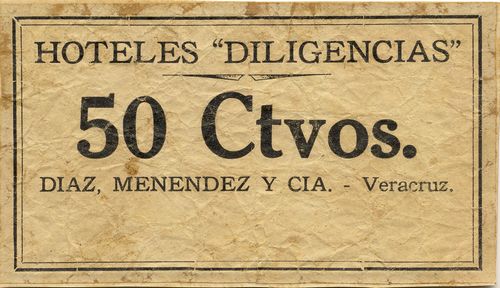Other private issues
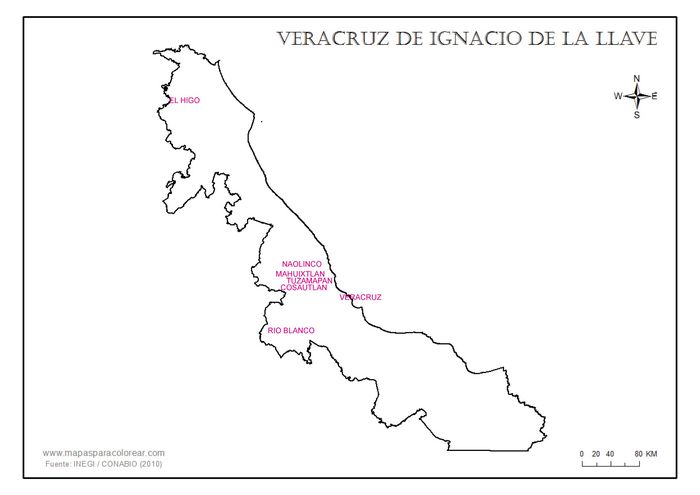
El Higo
Hacienda “El Higo”
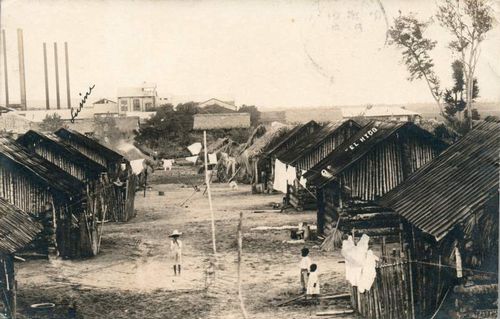
El Higo in 1910
The Compañía Azucarera del Pánuco, S. A. was founded in 1898 by a group of Frenchmen, including Julio M. Limantour and Hugo Scherer, Jr.AHAGN, Notary 62 and 543, Agustín Pérez de Lara, 24 September 1906. The company had a capital of $1,000,000. It planted 4,000 acres of sugar cane at its hacienda at El Higo, in the north of the state, under the management of Federico G. Proal, and the company’s engineer, Durand, went to New Orleans and France to buy machinery for their new millEl Imparcial, Tomo VI, Núm. 847, 12 January 1899. The company exported all of its production.
Because of the shortage of coins in the area, including the major port of Tampico, the company already used metal tokens in its tienda and brought in 1c coins from Mexico City, and we have a $5 vale dated 5 May 1915.
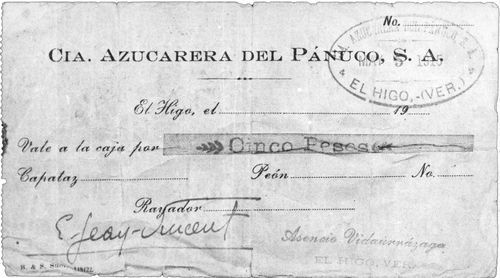
The company also issued $1 and $2 notes printed by Bouligny & Schmidt. The $1, Series A, is known with datestamp 22 April 1916
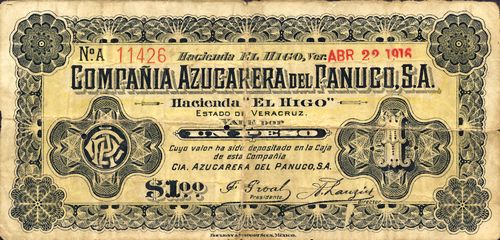
| series | date on note | from | to | total number |
total value |
||
| $1 | A | 4 January 1916 | includes number 01923 | ||||
| 22 April 1916 | includes number 11426 | ||||||
| $2 | 22 April 1916 | includes number 09507 | |||||
| $5 | 5 May 1915 |
The signatories are:
|
Federico Proal was elected a member of the board (consejero) of the Banco de Londres y México 14 April 1915 in substitution for José Spitalier, who was out of the countryThe Mexican Herald, 20 May 1915. He was an auditor (comisario) for the Papelera San Rafael from 1915 to 1917 and then a consejero from 1918 to 1924. He died in 1925. |
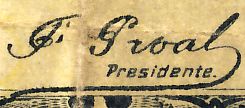 |
| A. Lanzier | 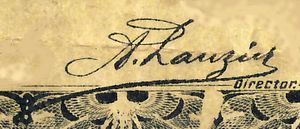 |
| E Jean-Vincent(?) |  |
| Asencio Vidaurrázaga |  |
Huayacocotla
Huayacocotla is a town in the Huasteca Baja region.
A series of cartones (1c, 25c, and 50c) for local use, with the name of Carlos Barranco, of "La Ciudad de Londres".
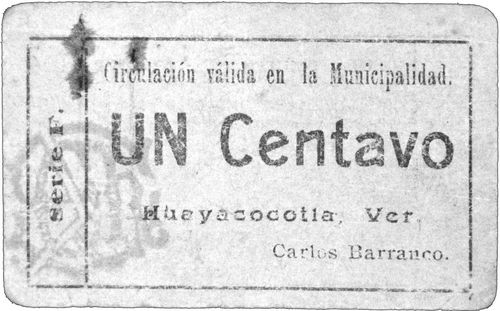
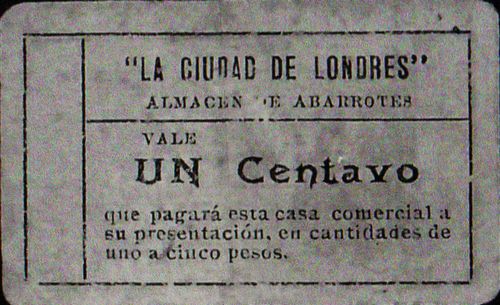
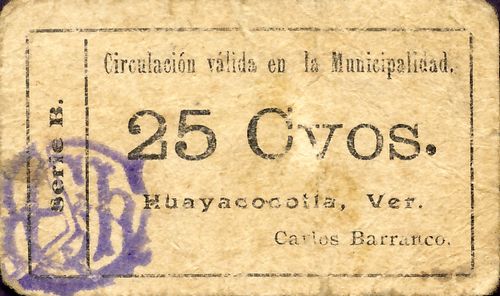
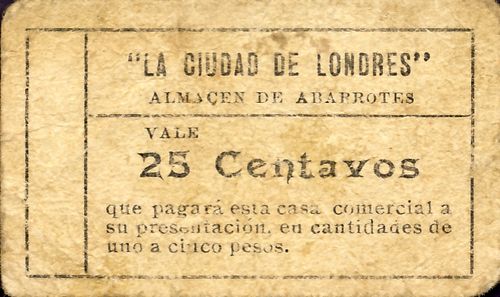
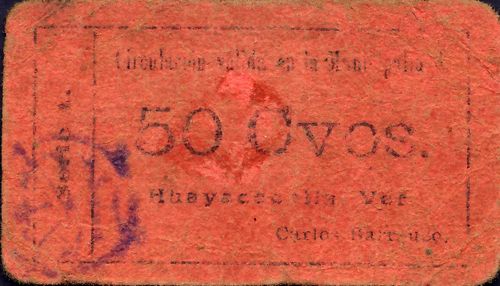
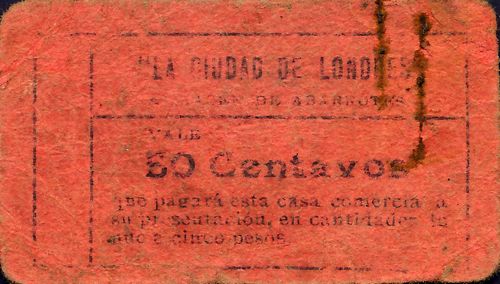
| series | from | to | total number |
total number |
||
| 1c | F | |||||
| 25c | B | |||||
| 50c |
Naolinco
Dominguez Hermanas
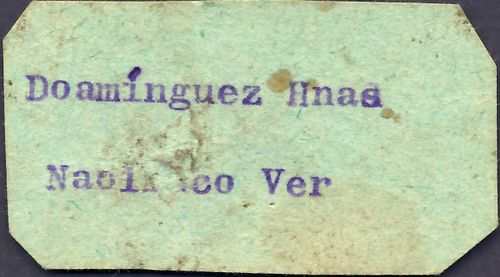
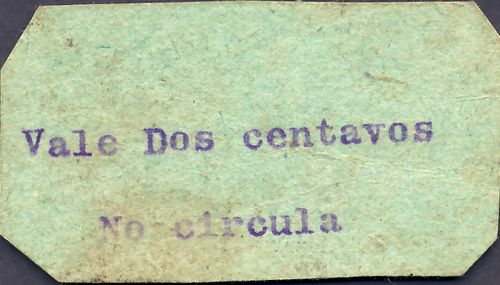
A typewritten 2c note. The text ‘no circula’ shows that it was for internal use.
Mahuixtlán
Hacienda de Mahuixtlán
Mahuixtlán is 19 kilometres south of Xalapa.
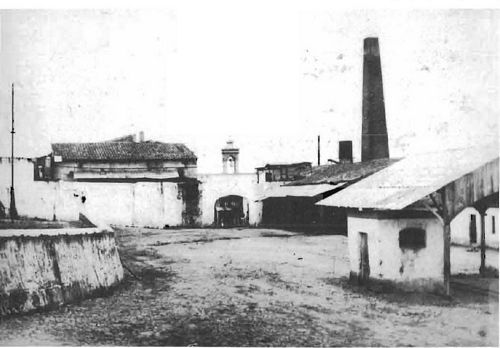
The sugarcane mill at Mahuixtlán, 1910 (courtesy J. C. Reyes. 1991)
The politician and businessmen Eduardo Dondé owned this hacienda: in 1880 he installed a still to produce aguardiente de caña, and in 1907 and 1910 a waterwheel to drive it. So the Francisco Hernández who issued a note for 50c, dated 22 August 1914, might have been the leasee or overseer or run a local tienda.
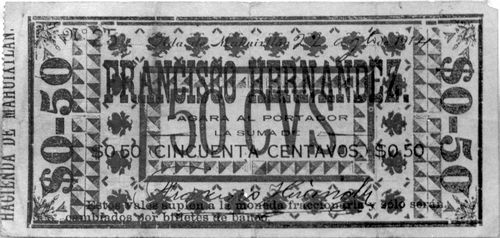
| Francisco Hernández |
Tuzamapam
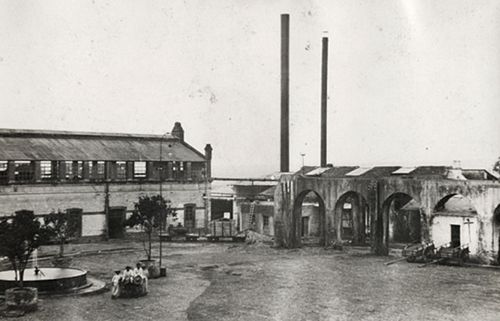
The Hacienda de Tuzamapam in 1926
(courtesy Archivo fotográfico Vicente Martínez Castro)
Tuzamapam is 14 kilometres east of Coatepec. The hacienda of Tuzamapam was founded in the eighteenth century under the name of San Juan Bautista, with the Gorozpe family as the first owners. Over time it became the largest ingenio in the region. During the nineteenth century most of the land was used for cattle breeding with sugar cane grown on 960 hectares of irrigated land, and some coffee plantations.
Around 1907, Luis Gorospe, son of the owner, began the installation of a mill, turning Tuzamapam into a sugar plantation. The construction lasted almost ten years and involved the construction of stone roads, railway tracks, bridges and irrigation canals, aqueducts, the construction of the main house and factory building and the transfer and installation of imported machinery. The area used for the cultivation of sugarcane increased, leading to an increase in the demand for labour.
Between 1900 and 1920, the hacienda had around 250 workers in the field. For its part, the installation, operation and maintenance of the factory involved the hiring of skilled artisans and workers, many of them brought from other states—mechanics, carpenters, electricians, among others—who had a higher status than farm workers Patricia Ponce y Cristina Núñez Madrazo, Tuzamapan: el poder viene de las cañas, 1992, Xalapa, Editora del Gobierno del Estado.
Working hours were organized according to the needs of the mill. The workers worked two shifts of six hours each and the field workers worked a twelve-hour day, the latter receiving lower wages: 50 to 75 cents per day for the labourers and 1.25 pesos for the workersFábregas, 1990. A part of the consumer goods was periodically received in kind – clothing, meat, corn. Within the area of the hacienda, a commercial activity was organized restricted to the existence of a single store, owned by the boss: the only difference with the typical tienda de raya is that workers were not allowed to go into debt.
We know of a series of notes (5c, 10c, 20c, 50c, $1 and $2), with the text reading “ Estos vales suplen al hacer la raya y serán cambiados por billetes de cinco pesos cuando se reunan vales por esa cantidad”.
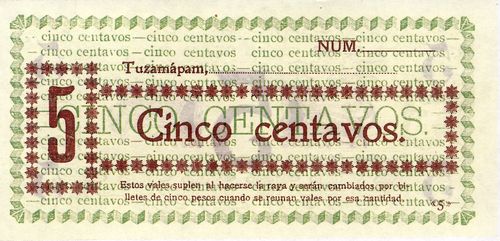
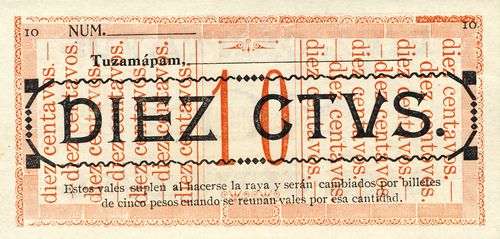
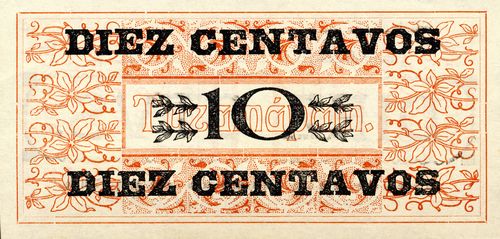
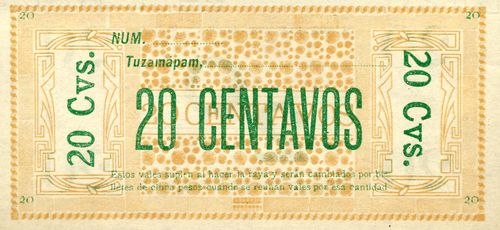
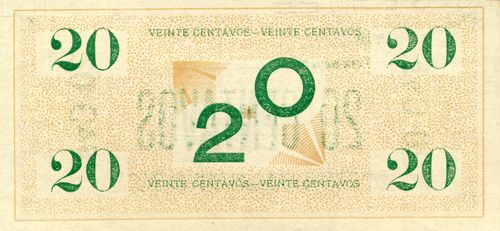
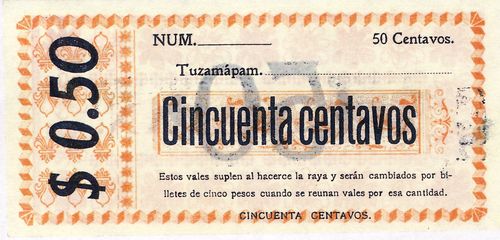
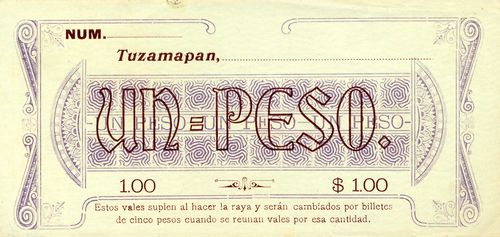
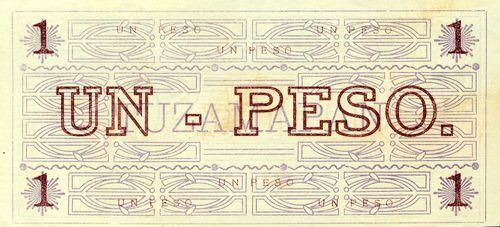
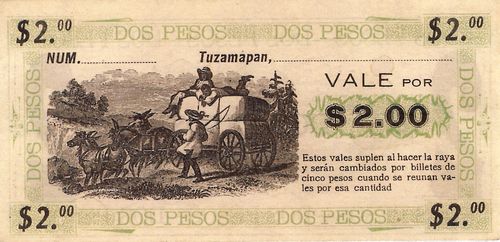
Cosautlan
Cosautlán is a town in the central mountainous area of Veracruz, about 25 kilometres south of Xalapa.
Carlos Cortés y Hermano
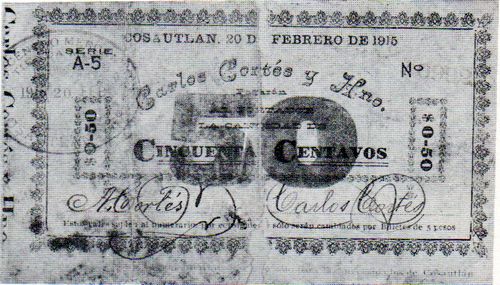
| series | from | to | total number |
total value |
||
| 50c | A-5 | includes number [ ] |
A 50c note, dated 20 February 1915 and signed by Carlos Cortés and A. Cortés, presumably his brother. The datestamp. for 20 February 1915, reads 'ASCENCIO MER[ ] - TIENDA M[IXTA]', so these ran a store.
| Carlos Cortés | 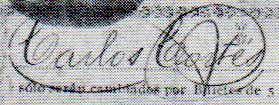 |
| A. Cortés | 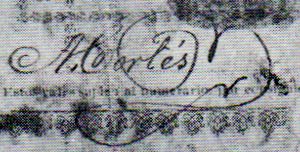 |
Botica de “San Rafael”
This chemist's, owned by José de J. Rincón, issued a 50c note, dated 1 March 1915. The legend reads 'Este Vale es provisional y sólo para facilitar las operaciones de la casa que los expide' so these were, expressly at least, only for use within the store and would have been a response to the lack of small change.
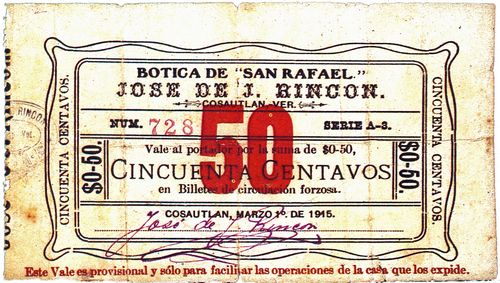
| series | from | to | total number |
total value |
||
| 50c | A-3 | includes number 728 |
They are signed by José de J. Rincón.
| José de J. Rincón was a magistrate in the Tribunal Superior de Justicia in Xalapa in 1899. |  |
Veracruz
After the Americans withdrew their forces a new Junta de Administración Civil was established on 24 November 1914. At one of its first sessions, on 1 December, the Inspector de Policía, Teodoro Frezieres, reported that some casas comerciales had issued cardboard vales (cartones-moneda) without any legal authorisation. He was ordered to collect in the paper money and consign the offenders to the authorities. He was also told to use the press to inform the public that such issues were prohibitedAHV, Actas del Cabildo (Junta de Administración Civil), libro 91, p14 so the next day he published a notice, warning stores that had made issues of moneda fiduciaria, in contravention of the Secretaría de Hacienda y Crédito Público, that they would be referred to the authorities for punishmentEl Dictamen, Año XVI, Núm. 1350, 4 December 1914.
Emilio Llaxa
Llaxa was one of the merchants who issued cartones, in his case for one and two centavos. On 23 December 1914 his lawyer, Manuel Lozada y Prado, asked the Junta de Administración Civil to return $48 that the police has confiscated. The Junta agreed to return the money, in Constitutionalist notes, and refer Llaxa to the Presidente of the Junta for judgementAHV, Actas del Cabildo (Junta de Administración Civil), libro 91, p50.
Hoteles “Diligencias”
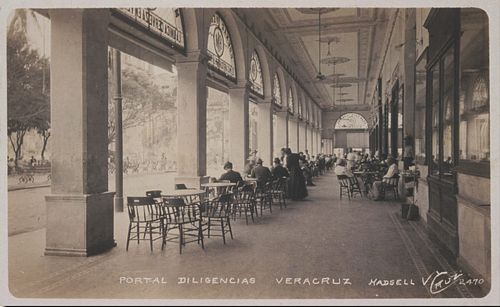
The Hotel Diligencias of Diáz, Menendez y Compañía faced the main square (and still does).
Salon "La Lonja"
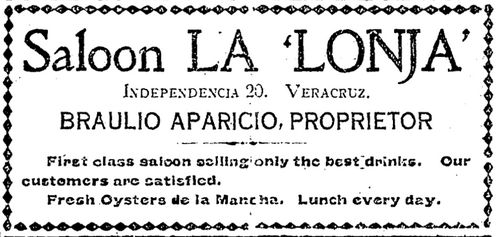
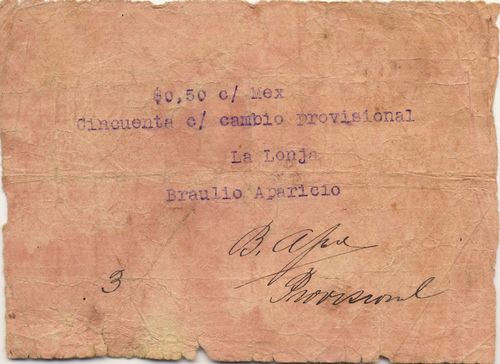
This simple typewritten note for 50c is catalogued as from Mexico City but is in fact from Veracruz. Braulio Aparicio advertised his restauant in The Mexican Herald from May to September 1914.
Compañía Limitada de Luz Eléctrica, Fuerza y Tracción de Veracruz
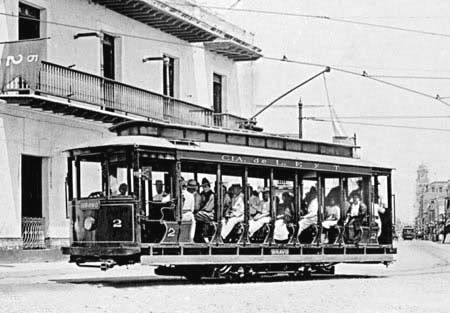
looking north up avenida Independencia from calle Rayón, with the cathedral tower in the distance
(courtesy collection Allen Morrison)
The Compañía de Luz, Fuerza y Tracción de Veracruz was registered in London on 28 July 1906. This new English company purchased the existing Ferrocarril Urbano and ordered ten cross-bench open trams from J. G. Brill in Philadelphia on 16 September 1907. The company inaugurated three routes of a new electric tram system on 5 July 1908. All started from the new railroad station on calle Montesinos and ran down avenida Independencia toward the old station on calle Rayón.
The catalogues list a ticket from this tram company but, as elsewhere, with similar tickets from the Compañía Eléctrica de Luz, Fuerza y Tracción de Tampico, S. A. in Tampico or the Compañía Hidroeléctrica e Irrigadora del Chapala, S. A. in Guadalajara, we need further documentary evidence before we can agree that these were used as paper currency.
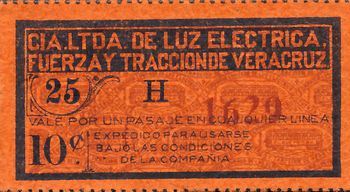
Rio Blanco
Compañía Industrial de Orizaba, S. A.
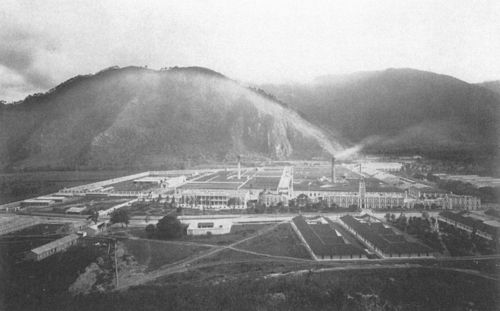
La Compañía Industrial de Orizaba S.A. operated four textile factories in the Orizaba valley, including one at Rio Blanco, the largest textile mill in the country.
In 1914 it issued bonos de caja provisionales.
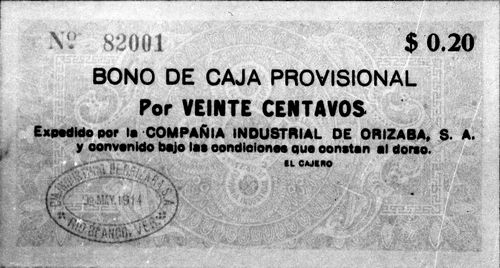
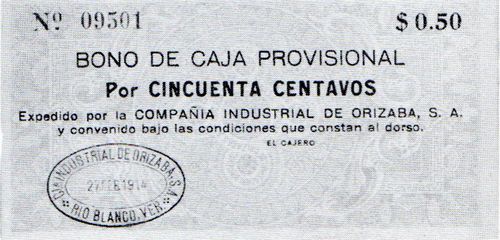
| date on note | series | from | to | total number |
total value |
||
| 20c | 9 May 1914 | JS | includes number 82001 | ||||
| 50c | 27 February 1914 | NP | includes number 09501 |
The conditions under which these notes operated were written on their reverse[text needed].


